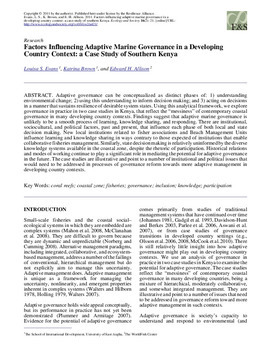Factors influencing adaptive marine governance in a developing country context: a case study of Southern Kenya

Citation
Evans, L.S.; Brown, K.; Allison, E.H. (2011). Factors influencing adaptive marine governance in a developing country context: a case study of Southern Kenya. Ecology and Society 16(2) online
Adaptive governance can be conceptualized as distinct phases of: 1) understanding environmental change; 2) using this understanding to inform decision making; and 3) acting on decisions in a manner that sustains resilience of desirable system states. Using this analytical framework, we explore governance in practice in two case studies in Kenya, that reflect the “messiness” of contemporary coastal governance in many developing country contexts. Findings suggest that adaptive marine governance is unlikely to be a smooth process of learning, knowledge sharing, and responding. There are institutional, sociocultural, and political factors, past and present, that influence each phase of both local and state decision making. New local institutions related to fisher associations and Beach Management Units influence learning and knowledge sharing in ways contrary to those expected of institutions that enable collaborative fisheries management. Similarly, state decision making is relatively uninformed by the diverse knowledge systems available in the coastal zone, despite the rhetoric of participation. Historical relations and modes of working continue to play a significant role in mediating the potential for adaptive governance in the future. The case studies are illustrative and point to a number of institutional and political issues that would need to be addressed in processes of governance reform towards more adaptive management in developing country contexts
Permalink
Date Available
Type
Publisher
Countries
ISSN
1708-3087
Language